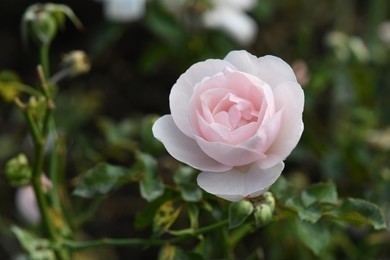Rosa Plant Tissue Culture
Rosa plants belong to the family Rosaceae and include more than 200 species, which are widely distributed in temperate and subtropical regions of the Northern Hemisphere. Rosa plants are used for a variety of purposes, mainly for ornamental purposes, some are used as medicine or spices, and many species are understory and forest edge shrubs and can be used for gardening.
 Rosa plant with light pink flowers
Rosa plant with light pink flowers
Conventional cuttings or grafting propagation is slow and the
low reproduction coefficient and high cost make it difficult to
be used on a large scale, but the tissue culture technology we
provide for Rosa plants can overcome these difficulties.
- Ornamental
- Medicinal uses
- Extraction of active substances
- Aromatic oil extraction
- Edible
- Landscaping
Rosa plants are widely adapted to their natural environment and cultivation has spread throughout the world. However, due to the highly heterozygous genome of Rosa plants, the phenomenon of self- or hybrid incompatibility and polyploidy within the genus, low fruit set rate, small germination rate, and long growth cycle, these factors have limited the research on their breeding and genetic characteristics.
Tissue culture service
Traditional propagation methods, such as cuttings and grafting, are still being applied in Rosa plant breeding, and there are problems of difficulty in survival or a very low survival rate. However, Lifeasible has successfully established an efficient Rosa plant regeneration system that can provide suitable temperature, humidity, light, and the hormones and carbohydrates required by the plants. Our stable propagation system can be applied to Rosa plant factory nursery for mass propagation.
We generally use young organs or tissues such as stem tips, young leaves, cotyledons, hypocotyls, embryos, etc. as explants for tissue culture, but we also have successful cases of using stem segments with axillary buds, mature leaves, roots, and flowering organs as explants.
- Selection of culture medium
We mainly use basic media such as MS, WPM, SH, CM, and modified Nitsch in Rosa plant tissue culture.
We offer tissue culture of Rosa plants with a much higher reproduction rate than using conventional asexual propagation methods. The new seedlings obtained by our tissue culture not only retain the excellent traits of the original species, but also get completely virus-free infected plants, and the time used for tissue culture is much shorter than that for sown seedlings, cuttings, or grafted seedlings.
You want to sign a confidentiality agreement.
You have a specific plant species for your experimental needs.
You have a reliable and relevant cooperation project to discuss.
You are very interested in our project or have any questions.
You need an updated and detailed quotation.
For research or industrial use.

 Rosa plant with light pink flowers
Rosa plant with light pink flowers
